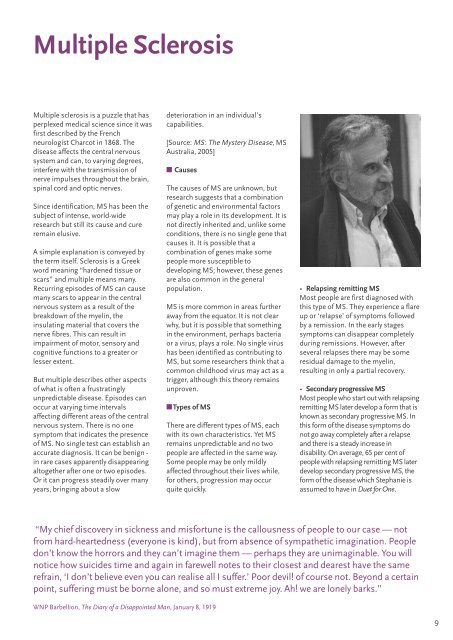to download the production programme as a PDF ... - Almeida Theatre
to download the production programme as a PDF ... - Almeida Theatre
to download the production programme as a PDF ... - Almeida Theatre
You also want an ePaper? Increase the reach of your titles
YUMPU automatically turns print PDFs into web optimized ePapers that Google loves.
Multiple Sclerosis<br />
Multiple sclerosis is a puzzle that h<strong>as</strong><br />
perplexed medical science since it w<strong>as</strong><br />
first described by <strong>the</strong> French<br />
neurologist Charcot in 1868. The<br />
dise<strong>as</strong>e affects <strong>the</strong> central nervous<br />
system and can, <strong>to</strong> varying degrees,<br />
interfere with <strong>the</strong> transmission of<br />
nerve impulses throughout <strong>the</strong> brain,<br />
spinal cord and optic nerves.<br />
Since identification, MS h<strong>as</strong> been <strong>the</strong><br />
subject of intense, world-wide<br />
research but still its cause and cure<br />
remain elusive.<br />
A simple explanation is conveyed by<br />
<strong>the</strong> term itself. Sclerosis is a Greek<br />
word meaning “hardened tissue or<br />
scars” and multiple means many.<br />
Recurring episodes of MS can cause<br />
many scars <strong>to</strong> appear in <strong>the</strong> central<br />
nervous system <strong>as</strong> a result of <strong>the</strong><br />
breakdown of <strong>the</strong> myelin, <strong>the</strong><br />
insulating material that covers <strong>the</strong><br />
nerve fibres. This can result in<br />
impairment of mo<strong>to</strong>r, sensory and<br />
cognitive functions <strong>to</strong> a greater or<br />
lesser extent.<br />
But multiple describes o<strong>the</strong>r <strong>as</strong>pects<br />
of what is often a frustratingly<br />
unpredictable dise<strong>as</strong>e. Episodes can<br />
occur at varying time intervals<br />
affecting different are<strong>as</strong> of <strong>the</strong> central<br />
nervous system. There is no one<br />
symp<strong>to</strong>m that indicates <strong>the</strong> presence<br />
of MS. No single test can establish an<br />
accurate diagnosis. It can be benign -<br />
in rare c<strong>as</strong>es apparently disappearing<br />
al<strong>to</strong>ge<strong>the</strong>r after one or two episodes.<br />
Or it can progress steadily over many<br />
years, bringing about a slow<br />
deterioration in an individual’s<br />
capabilities.<br />
[Source: MS: The Mystery Dise<strong>as</strong>e, MS<br />
Australia, 2005]<br />
■ Causes<br />
The causes of MS are unknown, but<br />
research suggests that a combination<br />
of genetic and environmental fac<strong>to</strong>rs<br />
may play a role in its development. It is<br />
not directly inherited and, unlike some<br />
conditions, <strong>the</strong>re is no single gene that<br />
causes it. It is possible that a<br />
combination of genes make some<br />
people more susceptible <strong>to</strong><br />
developing MS; however, <strong>the</strong>se genes<br />
are also common in <strong>the</strong> general<br />
population.<br />
MS is more common in are<strong>as</strong> fur<strong>the</strong>r<br />
away from <strong>the</strong> equa<strong>to</strong>r. It is not clear<br />
why, but it is possible that something<br />
in <strong>the</strong> environment, perhaps bacteria<br />
or a virus, plays a role. No single virus<br />
h<strong>as</strong> been identified <strong>as</strong> contributing <strong>to</strong><br />
MS, but some researchers think that a<br />
common childhood virus may act <strong>as</strong> a<br />
trigger, although this <strong>the</strong>ory remains<br />
unproven.<br />
■Types of MS<br />
There are different types of MS, each<br />
with its own characteristics. Yet MS<br />
remains unpredictable and no two<br />
people are affected in <strong>the</strong> same way.<br />
Some people may be only mildly<br />
affected throughout <strong>the</strong>ir lives while,<br />
for o<strong>the</strong>rs, progression may occur<br />
quite quickly.<br />
• Relapsing remitting MS<br />
Most people are first diagnosed with<br />
this type of MS. They experience a flare<br />
up or ‘relapse’ of symp<strong>to</strong>ms followed<br />
by a remission. In <strong>the</strong> early stages<br />
symp<strong>to</strong>ms can disappear completely<br />
during remissions. However, after<br />
several relapses <strong>the</strong>re may be some<br />
residual damage <strong>to</strong> <strong>the</strong> myelin,<br />
resulting in only a partial recovery.<br />
• Secondary progressive MS<br />
Most people who start out with relapsing<br />
remitting MS later develop a form that is<br />
known <strong>as</strong> secondary progressive MS. In<br />
this form of <strong>the</strong> dise<strong>as</strong>e symp<strong>to</strong>ms do<br />
not go away completely after a relapse<br />
and <strong>the</strong>re is a steady incre<strong>as</strong>e in<br />
disability. On average, 65 per cent of<br />
people with relapsing remitting MS later<br />
develop secondary progressive MS, <strong>the</strong><br />
form of <strong>the</strong> dise<strong>as</strong>e which Stephanie is<br />
<strong>as</strong>sumed <strong>to</strong> have in Duet for One.<br />
“My chief discovery in sickness and misfortune is <strong>the</strong> callousness of people <strong>to</strong> our c<strong>as</strong>e — not<br />
from hard-heartedness (everyone is kind), but from absence of sympa<strong>the</strong>tic imagination. People<br />
don’t know <strong>the</strong> horrors and <strong>the</strong>y can’t imagine <strong>the</strong>m — perhaps <strong>the</strong>y are unimaginable. You will<br />
notice how suicides time and again in farewell notes <strong>to</strong> <strong>the</strong>ir closest and dearest have <strong>the</strong> same<br />
refrain, ‘I don’t believe even you can realise all I suffer.’ Poor devil! of course not. Beyond a certain<br />
point, suffering must be borne alone, and so must extreme joy. Ah! we are lonely barks.”<br />
WNP Barbellion, The Diary of a Disappointed Man, January 8, 1919<br />
9

















